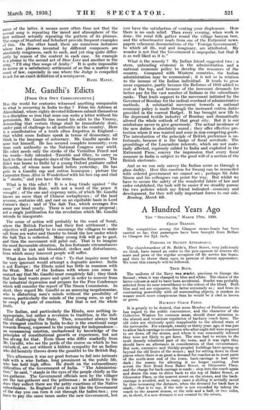A Hundred Years Ago
The competition among the Glasgow steam-boats has been carried so far, that passengers have been brought from Belfast to Glasgow for 20. each.
PERSONS OF DECENT APPEARANCE.
The churchwardens of St. Bride's, Fleet Street, very judiciously we think, have issued an order to the pew-openers to reserve the seats and pews of the regular occupiers till the service has begun, and then to throw them open to persons of decent appearance. We trust this example will be followed.
TRUE BLUE.
The uniform of the Navy was owlet, previous to George the Second ; when it was changed to blue and white. The choice of the latter colours is said to have been accidental. Scarlet was probably selected from its near resemblance to the colour of the blood. Both blue and red are expensive, the latter extremely so ; and from its contrasting powerfully with all surrounding objects, it renders its wearer much more conspicuous than he would be if clad in brown or green. HACKNEY COACH FARES.
It is greatly to be desired, that some Member of Parliament who has regard to the public convenience, and the character of the Collective Wisdom for common sense, should draw attention to the absurd and vexatious regulation of hackney coach fares. The old rules are obviously quite inapplicable to the altered state of the metropolis. For example, twenty or thirty years ago, it was just to allow back-carriage to coachmen who after night-fall were required to set down off the stones, and where it was reasonably inferred they were not likely to get fares. The men had to return to the most densely inhabited part of the town, and it was right they should have an allowance in consideration of that circumstance. But now, extensive and thickly-peopled buildings have sprung up beyond the old limits of the stones ; and for setting down in those places where there is as great a demand for coaches as in most parts of the north-west end of the town, back-carriage is had after dark ; the reason for allowing it no longer existing. Just
across the New Road from Baker Street, or Gloucester Place, and the charge' for back-carriage is made : step into the coach again and desire the man to drive back to the top of Baker Street, or Gloucester Place, or the nearest street on the stones, and the back- carriage is avoided, and in many cases a shilling is actually saved
by thus increasing the distance, when the demand for back fare is -made,—that is to say, if the mile is not exceeded by taking the coach to the nearest stones, or the mile and a half, or two miles, or, in short, if a new distance is not created by the return.














































 Previous page
Previous page